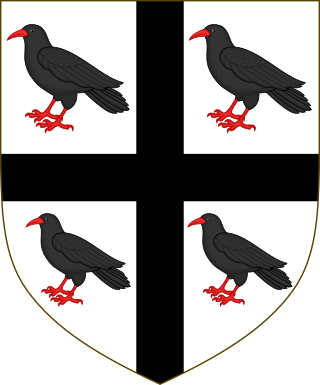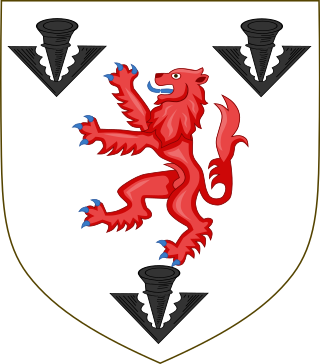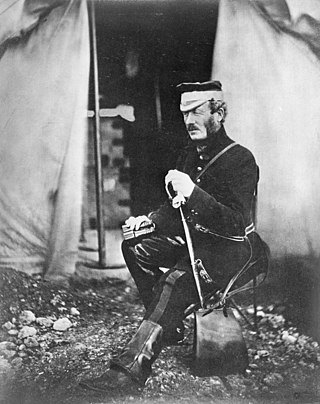
Viscount Cobham is a title in the Peerage of Great Britain that was created in 1718. Owing to its special remainder, the title has passed through several families. Since 1889, it has been held by members of the Lyttelton family.

Earl of Scarbrough is a title in the Peerage of England. It was created in 1690 for Richard Lumley, 2nd Viscount Lumley. He is best remembered as one of the Immortal Seven who invited William of Orange to invade England and depose his father-in-law James II. Lumley had already been created Baron Lumley, of Lumley Castle in the County of Durham, in 1681, and Viscount Lumley, of Lumley Castle in the County of Durham, in 1689. These titles are also in the Peerage of England. The title of Viscount Lumley, of Waterford, was created in the Peerage of Ireland in 1628 for his grandfather Sir Richard Lumley, who later fought as a Royalist in the Civil War.

Earl of Buckinghamshire is a title in the Peerage of Great Britain. It was created in 1746 for John Hobart, 1st Baron Hobart.

Baron Vernon, of Kinderton in the County of Chester, is a title in the Peerage of Great Britain. It was created in 1762 for the former Member of Parliament George Venables-Vernon. He had previously represented Lichfield and Derby in the House of Commons. Born George Vernon, he was the son of Henry Vernon, of Sudbury in Derbyshire, and Anne Pigott, daughter and heiress of Thomas Pigott by his wife Mary Venables, sister and heiress of Sir Peter Venables, Baron of Kinderton in Cheshire. In 1728, he assumed by Royal Licence the additional surname of Venables upon inheriting the Venables estate in Cheshire from his childless cousin Anne, widow of the 2nd Earl of Abingdon.

Lord Aylmer, Baron of Balrath, in the County of Meath, is a title in the Peerage of Ireland. It was created in 1718 for the naval commander Matthew Aylmer, the second son of Sir Christopher Aylmer, 1st Baronet, of Balrath. Lord Aylmer's son, the second Baron, represented Rye in the House of Commons. The latter's grandson, the fourth Baron, succeeded his kinsman as seventh Baronet, of Balrath, in 1776. The titles remain united. He was succeeded in both titles by his son, the fifth Baron. He was a general in the Army and served as Governor General of Canada from 1830 to 1835. Lord Aylmer assumed by Royal licence the additional surname of Whitworth in 1825 on the death of his uncle Charles Whitworth, 1st Earl Whitworth. On his death, the titles passed to his younger brother, the sixth Baron. He was an admiral in the Royal Navy.

Baron Macdonald, of Slate in the County of Antrim, is a title in the Peerage of Ireland. It was created in 1776 for Sir Alexander Macdonald, 9th Baronet, of Sleat. The Macdonald family of Sleat descends from Uisdean Macdonald, also known as Hugh of Sleat, or Hugh Macdonald, who was an illegitimate son of Alexander Macdonald, Earl of Ross. On 28 May 1625, his great-great-great-great-grandson Donald Gorm Og Macdonald was created a baronet, of Sleat in the Isle of Skye in the County of Inverness, in the Baronetage of Nova Scotia. The baronetcy was created with remainder to heirs male whatsoever and with a special clause of precedence which provided that it should have precedency over all former baronets.

Baron Tollemache, of Helmingham Hall near Ipswich in the County of Suffolk, is a title in the Peerage of the United Kingdom. The Tollemache family's surname and the title of the barony is pronounced TOL-mash.
The Egerton, laterGrey Egerton, later stillEgerton baronetcy, of Egerton and Oulton in the county of Chester, is a title in the Baronetage of England held by the senior patrilineal branch of the Egerton family.

There have been two baronetcies created for people with the surname Tollemache, or Talmash, one in the Baronetage of England and one in the Baronetage of Great Britain.
There have been three baronetcies created for members of the Gore family, all in the Baronetage of Ireland. All three titles are extant. The family also holds two earldoms and a barony.
There have been three baronetcies created for persons with the surname Bellingham, one in the Baronetage of England, one in the Baronetage of Ireland and one in the Baronetage of Great Britain. As of 2014 one creation is extant.
There have been six baronetcies created for persons with the surname Brooke, one in the Baronetage of England, one in the Baronetage of Ireland and four in the Baronetage of the United Kingdom. As of 2015 four of the creations are extant, though one has been subsumed into a peerage.

The Price, later Rugge-Price Baronetcy, of Spring Grove in Richmond in the County of Surrey, is a title in the Baronetage of the United Kingdom. It was created on 2 February 1804 for Charles Price, Member of Parliament for the City of London from 1802 to 1812 and Lord Mayor of London from 1802 to 1803. The fifth Baronet assumed in 1874 by Royal licence the additional surname of Rugge. As of 28 February 2014 the present Baronet has not successfully proven his succession and is therefore not on the Official Roll of the Baronetage, with the baronetcy considered dormant since 2000.
There have been four baronetcies created for persons with the surname Musgrave, one in the Baronetage of England, one in the Baronetage of Nova Scotia, one in the Baronetage of Ireland and one in the Baronetage of the United Kingdom. As of 2014 two of the creations are extant.
There have been three baronetcies created for persons with the surname Clayton, two in the Baronetage of Great Britain and one in the Baronetage of the United Kingdom. One creation is extant as of 2021.
There have been two baronetcies created for persons with the surname Coghill, both in the Baronetage of Great Britain. One creation is extant as of 2008.

The Smith, later Bromley, later Pauncefote-Bromley, later Bromley-Wilson, later Bromley Baronetcy, of East Stoke in the County of Nottingham, is a title in the Baronetage of Great Britain. It was created on 31 October 1757 for the banker George Smith, High Sheriff of Nottinghamshire from 1757 to 1759. He was the eldest son of Abel Smith I (1686–1756) of Nottingham, the 2nd son of Thomas Smith I (1631–1699), the founder of Smith's Bank in Nottingham. His younger brothers included: Abel Smith II (1717–1788) and John Smith, ancestor of Julian Pauncefote, 1st Baron Pauncefote.

Rode Hall, a Georgian country house, is the seat of the Wilbraham family, members of the landed gentry in the parish of Odd Rode, Cheshire, England. The estate, with the original timber-framed manor house, was purchased by the Wilbrahams from the ancient Rode family in 1669. The medieval manor house was replaced between 1700 and 1708 by a brick-built seven-bay building; a second building, with five bays, was built in 1752; the two buildings being joined in 1800 to form the present Rode Hall.

The Egerton family is a British aristocratic family. Over time, several members of the Egerton family were made Dukes, Earls, knights, baronets and peers. Hereditary titles held by the Egerton family include the dukedoms of Bridgewater (1720–1803) and Sutherland, as well as the earldoms of Bridgewater (1617–1829), Wilton (1801–1999) and Egerton (1897–1909). Several other members of the family have also risen to prominence. The Egerton family motto is Virtuti non armis fido.

General Sir Richard Wilbraham was a British Army officer who became colonel of the Royal Fusiliers.











